|
DURING the year that Abraham Lincoln lived in Macon county he did
not particularly distinguish himself, except that he began to gain a
reputation for wrestling and for making speeches. Life to him
then was about the same as that of the average young man of the
period. He did, however, spend more time in study than the
ordinary youth. Always anxious to learn, he never let pass an
opportunity to gain knowledge. He had what might have been called
a fairly good education at that time. He could read, write,
spell, and cipher to the "rule of three." He had read a number
of books, among them the Bible, Life of Washington by
Weems, Life and Speeches of Henry Clay, Pilgram's
Progress, Revised Laws of Indiana (1824), History of the United
States, Life of Marion, Life of Franklin, Robinson Crusoe,
Aesop's Fables, Murray's Reader, Arabian Nights, and
Kentucky Preceptor, and Webster's Blue Backed Speller, and an
etymological dictionary. Lincoln's reading was more than mere
reading. It was study. He memorized a great deal of what
he read, and he gave serious thought to all of it. Such a list
of books as that given, read in Lincoln's way, was enough to
provide a fairly good education in itself. After Abraham
Lincoln had helped his father get settled in their new home on
the Sangamon river bluff, he went out to look for a job. All
summer he worked for others, splitting rails, chopping wood,
plowing, harvesting. He broke up fifty acres of prairie land,
with four yoke of oxen. Some of his work went to pay for new
clothes. He bargained with Mrs. Nancy Miller to make
him a pair of trousers. For every yard of brown jeans cloth
used, he agreed to split 400 rails. It took a good deal of
material to cover the long-legged Lincoln. No wonder he
didn't get new clothes often! A fair price for splitting rails
in those days was 37-1/2 cents a hundred in trade or 25 cents in
cash. No doubt the young Abe soon got acquainted with the young
folks of the neighborhood, for he attended the "spellings" and
"singing bees" held at the log school house southwest of Decatur.
The story goes that he courted Mary (Polly) Warnick, but
evidently not for long, as she was married in June to another man,
Joseph Stevens. It gave Stevens something to
brag about, anyhow, for all his life he boasted of having cut
Lincoln out! Jemima Hill was another girl Lincoln
escorted home from gatherings. That probably meant little,
however, as in going from his own home to the school house
Lincoln scarcely had to go out of his way to reach the Hill
home. In fact, even though it was spring and Lincoln was a young
fellow of 21, he probably had no serious love affairs, after he came
to Macon county. He was one of the guests at the wedding of his
former sweetheart, Polly Warnick and Joe Stevens,
according to tradition. Lincoln was a handy man to have around
when there was rail splitting to be done in the neighborhood.
He was a master hand at the business, according to Dennis Hanks,
who said one day: "He was a master hand at maulin'
rails; my, how he could chop! His ax would flash and bite into
a tree and down it would come. If you heard him fallin' trees
in a clearing, you would say three men were at work by the way the
trees fell. He could sink an ax deeper into wood than any man
I ever saw." Lincoln and John Hanks made rails for
William Warnick. In the Hudelson house is a
walnut rail, which was kept by Robert Hudelson, and which was
said to be from a lot of 3,000 rails made by Lincoln.
HIS SPEECHES Wearing a broad brimmed straw hat, a "hickory" shirt,
tight tow linen trousers, and with feet bare, Lincoln made
one of his first political speeches in front of the Harrell
tavern which then stood on the present site of Central block, on the
square which bears his name. The tavern was a two-story
building, with long veranda on the south. In front were
several trees, one of which had broken off, leaving splintery stump.
Lincoln, according to the story of that speech as told
afterward by Mrs. Harrell, was working for a Mr. Shepherd
who had land west of what is now Church street and north of West
Main. One day while plowing with oxen in the field there,
Lincoln heard the sound of cheering on the square, and with a
youth's curiosity, stopped his team and went over to see what was
going on.
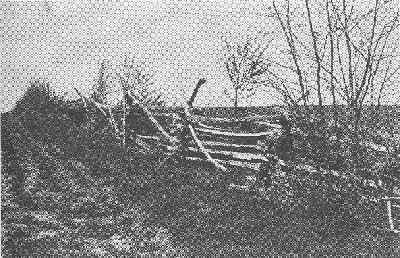
LINCOLN RAIL FENCE ON SCROGGIN FARM.
He found a crowd of men listening to a Democrat making a political
speech and having considerable to say against the Old Line Whig
party, the party to which Lincoln adhered. It was more
than Lincoln could stand. The minute the speaker was
through, up hopped Lincoln to the splintery stump. The crowd
pressed forward, eager to see what was going to happen. With
all the fervor and tenseness of his nature, the tall, lank young
fellow refuted the attacks on his party. The splinters must have
been hard on those bare feet, for the young man had to shift his
position often. But the speech was made. The party was
defended. And the crowd cheered wildly! Then and there
Lincoln demonstrated that he could make a speech. Another
time Lincoln made a speech after an address by General Whiteside.
It dealt with the navigability of the Sangamon. "Who's that young
fellow?" asked the general. "His name's Abe Lincoln,
but outside of that I don't know anything about him," was I.
C. Pugh's reply. "He's nobody's d--d fool. Some of
these days that fellow is going to be heard from!" declared
Whiteside. Lincoln's talks on the navigability of the
Sangamon must have been effective. According to another story
told, Lincoln one day spoke on that subject just after a
speech by a man named Posey. John Hanks used to
say that this was Lincoln's first political talk. Posey
took Lincoln to one side and asked him where he had secured
his information, and encouraged him to keep on reading and studying.
In January, 1831, Mr. Posey introduced in the legislature a
resolution that the "committee on internal improvements be
instructed to inquire into the expediency of opening the navigation
of the Sangamon river as far as Decatur in Macon county. Another
speech made by Lincoln that was afterwards remembered was
given after a wrestling match in William Warnick's harvest
field. Lincoln was gaining considerable reputation as a wrestler,
and one day while the harvest hands were taking a brief rest, Jim
Owens, champion of that sport, challenged Lincoln to a
match. Lincoln threw his opponent, and while still holding him
down along came "Jim" Herrod with a bucket of cold water
which he dashed on the wrestlers. "I have always heard," said
Harrod, "that the best way to part two fighting dogs is to throw
cold water on them." "Uncle Jimmy" Sanders was Lincoln's
pal in those days.1 At anything from a wedding to a
fishing trip the two were seen together. Sanders was a
great wrestler himself, and he always told with pride that once he
threw Lincoln, who had in turn thrown the bully of the
county. A HARD YEAR The year which the
Lincolns spent in Macon county was the hardest year in the
history of the county. During the summer malaria was
prevalent, and the winter was made memorable by the deep snow.
No wonder Thomas Lincoln decided to move again. It is
quite evident that he and his family suffered from the ague and
fever, for Thomas Lincoln bought a good deal of "barks" at
the Renshaw store. Barks was a mixture of Peruvian bark
and whisky. One incident is told of Lincoln and the deep
snow that winter. Lincoln and John Hanks managed
to get over to the Robert Smith mill with a grist of corn, to
be ground. They found Smith in the field gathering
corn. He had one road cut through to the field and was picking
the corn left exposed above the top of the snow. Mr. Smith
asked if conditions were as bad on the other side of the river, and
Lincoln replied: "Yes, we have to do worse than that, for we have
used up all our corn, and now have to go to the neighbors for
assistance." One day during that winter Lincoln started
over to the Warnick home, and got his feet wet in crossing
the Sangamon. By the time he reached the Warnick home
his feet were frozen, and he was laid up there for weeks. Thomas
Lincoln left Macon county the following spring, expecting to
go back to Indiana. He stopped in Coles county, however, and
then decided to remain there. He lived in that county the rest
of his life. The same spring, Abraham Lincoln left Macon
county. Denton Offut, trader, who wanted to send
flatboats filled with produce, down to New Orleans, offered John
Hanks and Abraham Lincoln the job of taking the boats
down. John Johnston, stepson of Thomas Lincoln
also went along. They were to be paid 50 cents a day, and $60
to be divided at the end of the trip. From Decatur to Springfield,
where they were to meet Offut, they made the trip in a canoe
over the Sangamon. This was just about a year after Lincoln
had arrived in Macon county. Never again did Abraham
Lincoln come back to call Macon county his home. On his
return from the trip south Lincoln was offered a job in Offut's
store in New Salem. That ended his connection with Macon
county, as a home, and opened a new chapter in his life, his career
at New Salem. JOHN HANKS John Hanks, who
was so intimately associated with his cousin, Abraham Lincoln,
and who induced Lincoln to make his first public speech, was
a picturesque figure. He was one of the earliest settlers in
the county, and lived here until his death July 1, 1889.2
His body lies in Boiling Springs cemetery.
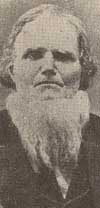
JOHN HANKS Outside of his connection
with Lincoln, he was one of the county's busy citizens.3
He served on the first and second grand juries, was a ranger in
Captain Johnson's company during the Black Hawk war, made
numerous trips to New Orleans by flatboat, and in the Civil War was
a wagon master in Grant's regiment. During the gold rush he
made a trip to California, remaining three years and after the Civil
war made several trips west. He was appointed as Indian agent
by President Lincoln. It is thought that John Hanks
was the only one of Hanks family invited to Abraham
Lincoln's wedding. Once after Lincoln was elected
president Hanks visited him at the White House. When John
Hanks first settled in the county he built a log cabin in Hickory
Point township. That cabin burned about 1866. Mr. Hank's
second home was a brick house. That house is still standing
and is herewith reproduced.
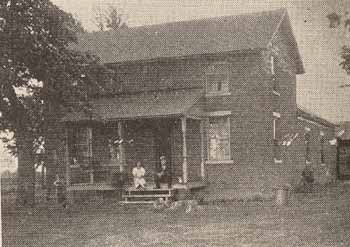
JOHN HANKS HOUSE John Hanks came into the limelight by helping
Abraham Lincoln split the rails for the fence for the Lincoln
homestead. The rails from this fence - two of which carried
the banner at the state Republican convention at the Decatur Wigwam
in 1860 - became known all over the world.
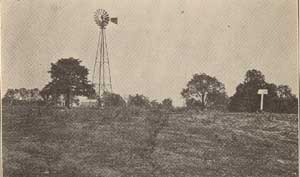
LINCOLN CABIN SITE (as it appears today)
James Hanks, brother of John, built his cabin about a quarter mile
north of his brother. William Hanks, Jr., another brother,
entered eighty acres of land west of the quarter section on which
Decatur was located. His cabin stood on the lot which is now
the site of the H. I. Baldwin home, 452 West Main street. Some
walnut logs from that cabin were used in the Baldwin house.
It is said that Lincoln often sprawled in the shade of the trees
there when he made trips in to town. This land was sold by Mr.
Hanks to William T. Crissey. There is a story to the effect
that his wife would not sign the deed until she received a new
dress. William Hanks also was a ranger in Johnson's
company in the Black Hawk war. He was supervisor of Road
District No. 1 for several years after Macon county was formed.
He died in January, 1836. William Hanks, Sr., brother
of the grandmother of Lincoln, Lucy Hanks, entered land in Section
22 in Harristown township. He was a member of the grand jury
in 1832. He is thought to have died about 1851 or 1852.
DENNIS HANKS Dennis Hanks, who came to Macon county
with the Lincolns, and left in about a year, lived afterwards in
Coles county. He was born May 15, 1799. It was he who
was the boyhood chum of Lincoln when the families lived in Kentucky,
and it was he who taught Abraham how to read and write.
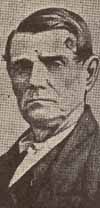
DENNIS HANKS Dennis
Hanks once was sent to Washington when Lincoln was
president, to intercede in behalf of some men who had been
imprisoned, without trial, after riots at Charleston, in which nine
men had been killed. President Lincoln granted the
request of his old-time friend, and the prisoners were set free.
Dennis Hanks died at the home of his daughter, Mrs. James
Shoaff, in Paris, Oct. 21, 1892. His wife, Elizabeth, died
in 1864. They are buried at Charleston, Ill.
Various other members of the Hanks family located in Macon
county, and many of their descendants are present-day citizens.
--------------
1 "Now, Abe, don't do
any wrong", said Uncle Jimmy Sanders to Abraham Lincoln
in his last visit with him before Lincoln started to Washington.
"I will not, if I know it," replied Lincoln.
2 At the time John
Hanks came to Macon county in 1829 his family consisted of
himself, his wife, Sarah Shrader Hanks ("Aunt Sookey"),
William and Jane Hanks (Mettlin). Later the
following children were born in the log cabin in which the family
lived northwest of Decatur: Emily (Loomis), Mary Ellen
(Manon), John Felix Hanks, Grason Hanks and
Levi (Toby) Hanks. Mrs. Manon is the only one
still living (1930). Her home is in Eureka, Cal. She is
eighty-six years old at this writing. John Felix Hanks
was drowned at the age of 23 while fording Stevens creek one night
on his way home during a storm. The bridge had washed out, and
both the young man and the horse he was riding were drowned.
That was in the year 1858.
3 One time when John
Hanks was serving on the petit jury, Lincoln drove the
horses home for Mrs. Hanks and spent the night at the Hanks
home. Mrs. Willis Johnson also was visiting there at
the time. While driving back to town the next morning,
Lincoln nearly pitched headlong out of the front end of the
wagon when he forded Stevens creek. On his way to town he
passed the ruins of the old school house which had just burned down.
According to records John Hanks served on the petit jury in
May, 1838.
Mrs. Johnson said that Lincoln wore a new suit of blue
jeans at that time. It may have been the suit woven for him by
Mrs. Samuel Horback. Lincoln bargained once with
Mrs. Hornback, who was a skilled weaver, for a suit of
clothes.
<PREVIOUS> <NEXT>
<CLICK
HERE TO RETURN TO TABLE OF CONTENTS>
|